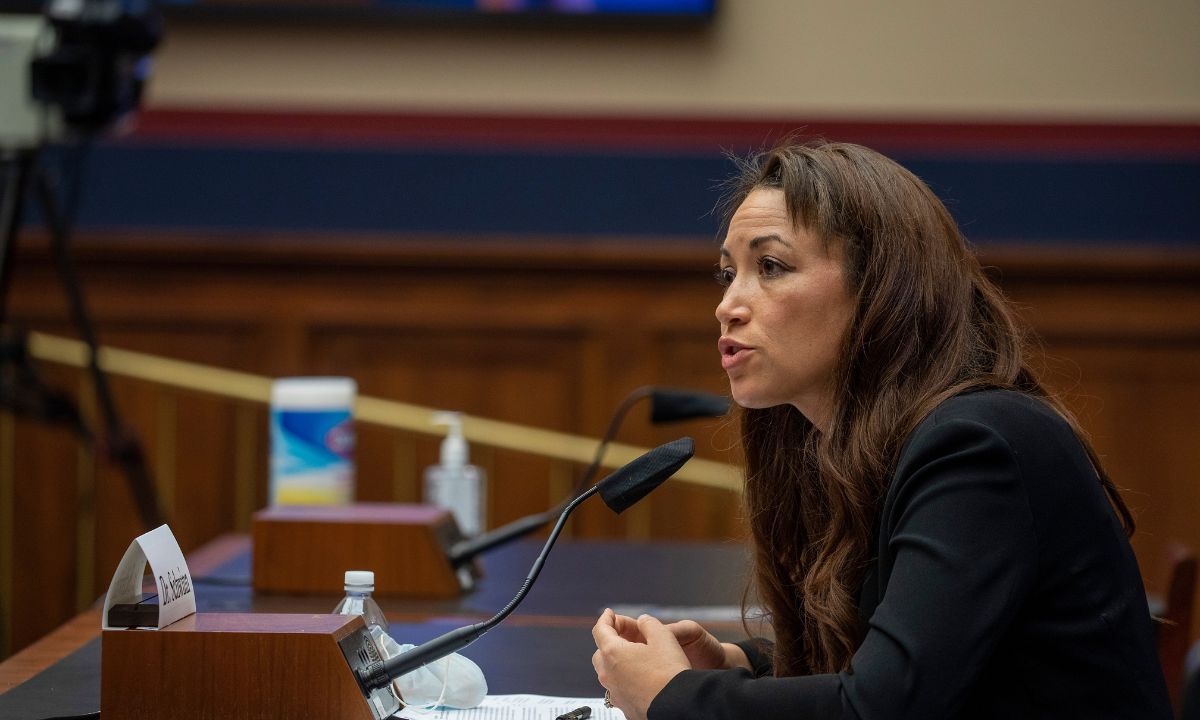Penny Schwinn Sought to Start a Business After Being Nominated for Ed Dept. Role. It Could Raise Questions
The department said the nominee, who goes before the Senate Thursday, 'worked with the relevant ethics officials and resolved any conflicts.'

Get stories like this delivered straight to your inbox. Sign up for The 74 Newsletter
Just one month after President Donald Trump tapped her to be the second in command at the U.S. Department of Education, Penny Schwinn registered a new educational consulting business in Florida with a longtime friend and business colleague, according to state documents reviewed by The 74.
The business venture never got off the ground, but the arrangement could raise ethical issues for Schwinn as she heads before the Senate education committee for confirmation Thursday.
The colleague with whom she co-founded the business, Donald Fennoy, told The 74 in an interview that the enterprise, named New Horizon BluePrint Group, was intended to combine their expertise as education leaders. Fennoy, the former superintendent of the Palm Beach County School District, was to consult with districts, while Schwinn, who has experience in Delaware, Texas and most recently as Tennessee’s education commissioner, would focus on state leadership. The pair have known each other for a decade, Fennoy said, meeting when they were part of the 2015-16 class of the Broad Academy, an education leadership program.
But the business does not appear among financial ties outlined in mandatory disclosure documents Schwinn submitted to the Office of Government Ethics on March 24. One reason could be that three weeks earlier, Schwinn’s sister, Katherine Sully, replaced her as manager of the business, according to state documents. Sully, a former assistant principal at a Texas charter school, has far less educational experience than Schwinn or Fennoy.
On Friday, as The 74 began asking Schwinn and the department questions about the venture, Fennoy dissolved the company, documents show, listing “business never started” as the reason.
“Right when we were securing the name, she got a phone call,” Fennoy told The 74, referring to the nomination. The plan, he said, was to bring in at least one more leader with district experience and build a team to do work “nationally and internationally.”
On Jan. 18, Trump announced his pick of Schwinn to be the department’s deputy secretary, citing her “strong record of delivering results for children and families.” The LLC wasn’t registered until Feb. 18.
But pressed for details about why Schwinn registered the business after her nomination, Fennoy appeared confused about the timeline. “This is on what day?” he asked in response to a reporter’s question. He did not respond to additional questions sent by email.
Contacted by The 74, Schwinn referred the matter to the Education Department. Madison Bidermann, a department spokesman, declined to address why Schwinn moved forward with a business venture after her nomination and said the nominee “worked with the relevant ethics officials and resolved any conflicts.”
Sully did not respond to attempts to contact her over email.
The Florida LLC would have been just one of Schwinn’s many business interests, detailed in the disclosure filed with the federal government. She stated in May that if confirmed, she would divest or resign her positions at multiple companies.
Historically, potential business conflicts could raise red flags for senators vetting a potential nominee. As deputy secretary, Schwinn would be tasked with overseeing federal policy and a vast network of K-12 programs — the same policy and programs that districts might seek help from a consulting firm to navigate.
She would also enter the department at a crisis point, as Education Secretary Linda McMahon drastically cuts staff and cancels funding to reach Trump’s goal of eliminating the department. The proposed 2026 budget slashes over $4 billion from K-12 programs, raising concerns that officials won’t be able to carry out their congressionally mandated duties
‘This administration is unique’
The period between nomination and confirmation is typically a time when candidates distance themselves from financial entanglements and potential conflicts of interest.
“Once you’re nominated, the typical rule of thumb would be that you kind of slow down,” said Dylan Hedtler-Gaudette, interim vice president for policy and government affairs at the Project On Government Oversight, a nonprofit focused on government accountability. “You probably wouldn’t establish a new LLC, for example”
But Schwinn is not a typical nominee, and this is not a typical administration.
Trump reportedly held an exclusive dinner on May 22 for investors in his meme coin, a form of cryptocurrency. As president, he maintains control of his business empire. In the midst of negotiations with Vietnam over punishing U.S. tariffs, for example, the country approved the development of Trump hotels and golf courses. Previous reporting revealed that FBI Director Kash Patel refused to divest from a Chinese “fast fashion” company, and Defense Secretary Pete Hegseth’s wife owned stock in companies that contract with that department.
It’s not unusual for administrations to run into trouble with officials who have close ties to the industries they oversee, Hedtler-Gaudette said. In 2022, his group filed a complaint about a Biden administration official in charge of digital services who had investments in the tech industry.
“But this administration is unique,” he said, “and just doesn’t seem to take any of that into consideration.”
Schwinn is also an unusual choice. She has fans among GOP moderates and Democrats. The former charter school founder and Teach for America alum earned respect for directing COVID relief funds toward academic recovery in Tennessee and implementing far-reaching reforms in reading instruction.
For a Trump nominee, she has also faced a high degree of conservative ire. Some of that is due to her past support for the kind of diversity, equity and inclusion initiatives the Trump administration wants to eliminate from schools, like hiring more teachers of color. But accusations of conflicts of interest and other ethical lapses have followed her for years.
They include a $4.4 million no-bid contract that the Texas Education Agency signed in 2017 with SPEDx, a Georgia software startup, despite what a state audit called Schwinn’s “professional relationship” with a subcontractor for the company. At the time, she was a deputy superintendent of the state agency.
Critics also point to an $8 million deal in 2021 that the Tennessee Department of Education signed with TNTP, a teacher training organization where her husband Paul Schwinn was employed at the time. The state’s procurement office approved the contract and Schwinn agreed to distance herself from the project, but some lawmakers still considered the deal a “huge conflict.”
“ ‘Drain the swamp’ is a phrase coined by President Trump, signifying the removal of corruption and special interests from government,” said J.C. Bowman, executive director of Professional Educators of Tennessee, a non-union association. “Many conservatives oppose Penny Schwinn’s nomination as deputy secretary of education, believing she embodies the interests they want to eliminate from the agency.”
Others say she left the state better off. She pushed requirements that districts screen students for reading difficulties and use a phonics-based curriculum. After the state passed a literacy law in 2021, roughly 30,000 teachers received summer training in the science of reading. The investments paid off. Tennessee was among the first to see test scores bounce back after the pandemic. Results from 2023-24 show students continue to make gains.
To many education advocates, she represents the best chance to shift the national department’s focus away from culture war issues and toward bipartisan priorities like improving literacy and maintaining accountability.
“I certainly wholeheartedly hope she gets approved, and think members on both sides would be gratified by her performance in office,” said Rick Hess, director of education policy studies at the conservative American Enterprise Institute.
Yet dozens of conservative groups and individuals have sent senators letters outlining why they think she’s wrong for the job. They list, for example, her affiliation with Chiefs for Change, made up of left-leaning district and state officials, and cite complaints about her support for a reading curriculum they say has elements of critical race theory, which holds that racism in America is systemic.
Several were offended that Ruby Bridges’ children’s book about being the first Black child to integrate a white elementary school referenced “a large crowd of angry white people.” Others thought a first grade book about seahorses was inappropriate because it explains how males carry the eggs.

While never implemented, her plan to conduct “well-being” home visits during the pandemic still angers parents who consider it an example of government overreach.
If the committee advances Schwinn’s nomination, Tennessee Sen. Marsha Blackburn, a Republican who is running for governor, is expected to vote against her, multiple sources told The 74.
“She’s a Democrat, through and through,” said Elizabeth Story, legislative chair for the Tennessee chapter of Moms for Liberty, the conservative advocacy group that opposes progressive ideas in school about race, sex and gender. “We need President Trump to withdraw her.”
Just after her nomination, she met with anti-DEI activist Chris Rufo in an apparent effort to reassure the Trump administration she would be a good fit. According to his Jan. 21 post on X, she promised to “shut down the terrible programs at the Department of Education, fight critical race theory, gender cultism, and DEI in America’s schools, and support new initiatives on school choice and classical education.”
If she loses the support of some conservatives, she may have to lean on Democrats to secure her nomination.
To Leslie Finger, an assistant political science professor at the University of North Texas, that would be an appropriate finale to a nomination that has veered far from the typical Trump playbook.
“In many ways, she seems opposed to the Trump administration’s education agenda,” she said. “One might think it was meant to show that they want to reach across the aisle on education issues, since she would be supported by bipartisan education reform types. But when has the Trump administration taken actions to signal bipartisanship?”
Since leaving her post as Tennessee commissioner, Schwinn has invested in and been involved with companies at the forefront of education, her disclosure forms show. Those include Amira, an AI reading curriculum program; Odyssey, a vendor that manages education savings accounts in multiple states; and Edmentum, an online curriculum and assessment company. She’s also a board member for Really Great Reading, a literacy program used in at least five states, and a consultant for BHA Strategy, a lobbying firm.
Blake Harris, former communications director for Tennessee Gov. Bill Lee, a Republican, founded BHA, where Schwinn served as chief operating officer until February. Two other LLCs she owns would cease operations, she wrote in a letter to the Education Department.
John Pelissero, a government ethics expert at Santa Clara University in California, said her financial ties deserve a closer look.
“What she puts down on her disclosure form for her confirmation is always kind of an important starting point for how transparent she will be,” he said. “Scrutiny should be given to whether she has the capacity to demonstrate that she’ll act in the public interest.”
‘A pragmatist’
Schwinn isn’t the first Trump nominee to face opposition from Republicans. Sen. Mitch McConnell, the former majority leader from Kentucky, voted against Hegseth and Health and Human Services Secretary Robert F. Kennedy Jr. But those objections focused more on the nominees’ qualifications, said Jonathan Collins, an assistant professor of education and political science at Teachers College, Columbia University.
Conservatives’ concerns about Schwinn, “seem like more of a test — or critique — of her loyalty to the new Republican culture war coalition,” he said. “She’s as moderate as it gets. She’s a pragmatist who in no way pushes far-left progressive policies.”
Under McMahon, the department required states to sign a certification saying they wouldn’t implement DEI programs. The Office for Civil Rights has also prioritized investigations into state and district policies allowing transgender students to compete against girls in school sports.

Not all parental rights advocates are opposed to her nomination.
Moms for America, founded in 2004, is a conservative, Christian organization that shares many of the same values as Moms for Liberty. Last year, the group presented Trump with its Man of the Century Award.
The organization, however, said Schwinn would make “an excellent choice” for deputy secretary, citing her “extensive experience as an educator, innovator and state leader.”
As the department’s number two, she would oversee K-12 initiatives, which McMahon has said will prioritize the science of reading, school choice and giving states more control over education.
“She has a proven ability to improve student outcomes, champion school choice, and navigate crises like the pandemic,” the organization said in a statement to The 74. “We stand by her candidacy for nomination as deputy education secretary and wish her the best in that role.”
Disclosure: According to financial disclosure documents filed with the Office of Government Ethics, Penny Schwinn earned $250,000 as a consultant and adviser to the Walton Family Foundation. The foundation provides financial support to The 74.
Get stories like these delivered straight to your inbox. Sign up for The 74 Newsletter

;)
